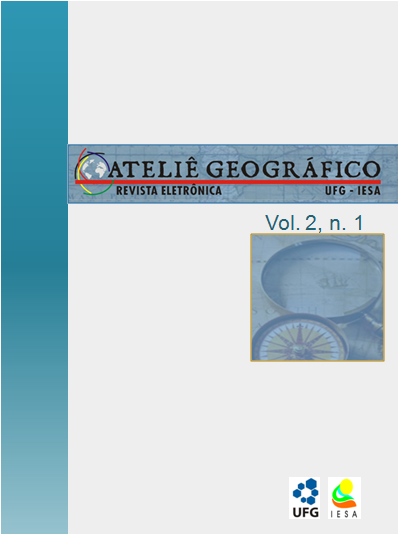THE FRENCH-BRAZILIAN BOARDING AREA: SOME GEOGRAPHICAL VIEWS
DOI:
https://doi.org/10.5216/ag.v2i1.3896Abstract
The boarding area by along Oiapock River, between nowadays Amapá Brazilian State and French Guyana, was the stage of a long content litigious amid both countries. This article analyses some geographical views over the region. We began the text with the authority based on the scientific view over the space. By the way, we followed with the official speech of the Brazilian’s government presented to support his mission for colonization and occupation of the northern territory. By other hand, this last official speech was enfaced by popular testimonies of ancient inhabitants of the region, people more worried with their day-a-day survivor than any new expectative to belongs or notbelongs to a national state. We intend to riche this understanding with the speech wrote by Foucault on power and geography and, also, his heterotopy concept. Keyboards: imperialism, power, heterotopy, Amapá, French GuyanaDownloads
Download data is not yet available.
Downloads
Published
2008-05-10
How to Cite
ROMANI, Carlo. THE FRENCH-BRAZILIAN BOARDING AREA: SOME GEOGRAPHICAL VIEWS. Ateliê Geográfico Journal, Goiânia, v. 2, n. 1, p. 43–64, 2008. DOI: 10.5216/ag.v2i1.3896. Disponível em: https://revistas.ufg.br/atelie/article/view/3896. Acesso em: 2 mar. 2026.
Issue
Section
Articles
License
Autores que publicam nesta revista concordam com os seguintes termos:- Autores mantém os direitos autorais e concedem à revista o direito de primeira publicação, com o trabalho simultaneamente licenciado sob a Licença Creative Commons Attribution que permite o compartilhamento do trabalho com reconhecimento da autoria e publicação inicial nesta revista.
- Os autores não serão remunerados pela publicação de trabalhos na Revista Ateliê Geográfico. Além disso, os conteúdos publicados são de inteira e exclusiva responsabilidade de seus autores, ainda que reservado aos editores o direito de proceder a ajustes textuais e de adequação às normas da publicação.
- Autores têm permissão e são estimulados a divulgar seu trabalho online (ex.: em repositórios institucionais ou na sua página pessoal), já que isso pode gerar alterações produtivas, bem como aumentar o impacto e a citação do trabalho publicado (Veja O Efeito do Acesso Livre).


